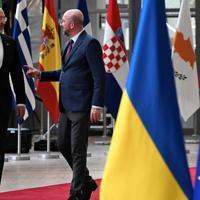Brussels
EU leaders said at a summit on Thursday that they will provide more arms to Ukraine's underarmed military, while at the same time consolidating its aggressive and grip on power to counter newly emboldened Russian President Vladimir Putin. We will be working on ways to rearm our country.
More than two years into an all-out war between Moscow and its neighbors, Kiev's military is struggling to hold back Russian forces as Western aid fails to keep up with the fighting.
EU foreign policy chief Josep Borrell warned ahead of the Brussels meeting: “If Ukraine has to surrender, a puppet government will be established in Kiev and the Ukrainian people will be crushed.” .
“Russian troops will come to our borders and we can be sure that they will not stop there.”
Following his victory in the presidential election over the weekend, bullish President Vladimir Putin on Wednesday described it as a “prologue” to victory in Ukraine.
Kiev desperately needs more arms and ammunition to fend off Putin's forces, which have recently won on the battlefield.
With a $60 billion aid package still stalled in Washington, the EU's 27 leaders are scheduled to discuss a plan to use profits from Russia's central bank's 200 billion euros in frozen assets to finance weapons for Ukraine.
Officials said the proposal would give Kyiv around 3 billion euros a year in funding and that money could start flowing by July if EU countries agree quickly.
This is on top of the 33 billion euros the EU says it has provided in arms to Ukraine since the Kremlin invasion in February 2022.
Alongside efforts to ship more weapons to Kiev, the EU is also frantically grappling with ways to arm Ukraine and strengthen Europe's defense industry so it can build up its own military.
Brussels has put forward a number of proposals aimed at increasing production capacity, but some complain that Europe is not moving fast enough.
While Russia has put its economy on war footing, the EU has fallen well short of its promise last year to supply Ukraine with 1 million shells by this month.
Meanwhile, the Czech Republic is leading its own effort aimed at collecting hundreds of thousands of shells available around the world and sending them to Kiev.
Defense bonds?
“At this critical moment in world history, we must ensure that our defense posture matches the urgency of the threat,” European Council President Charles Michel said in an editorial.
“If you want peace, you must prepare for war.”
France, Estonia and Poland have floated the idea of using joint borrowing to finance defense spending, similar to the EU's massive support package during the coronavirus pandemic.
But the majority of member states, led by so-called “frugal” countries like Germany, are reluctant to go that far.
Instead, discussions are likely to focus on getting the EU's lending arm, the European Investment Bank, to increase funding for the sector.
For now, the bank is limited to investing in a small number of “dual-use products” that have both military and civilian functionality.
The response to the Ukraine conflict will take up much of the summit, but EU leaders will also be joined by UN Secretary-General António Guterres to call for a unified stance on the war in Gaza.
Diplomats said the overwhelming majority of countries supported calls for an “immediate humanitarian halt” to Israel's offensive and a warning against launching ground operations in Rafah.
But Hungary, a staunch ally of Israel, has repeatedly blocked efforts to take a tougher stance and could veto the deal again.
Closer to home, EU leaders appear likely to give the green light to start accession talks with Bosnia, as Russia's war sparks a push for regional enlargement.
Diplomats said Balkan countries were likely to reach an agreement to start talks, but they could only begin in earnest if the country passed further reforms.



